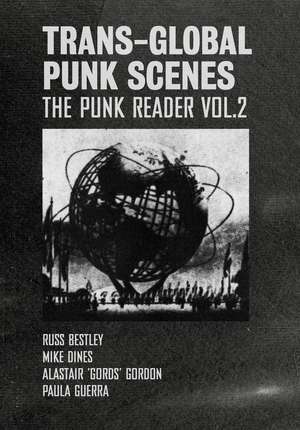Trans-Global Punk Scenes: The Punk Reader Volume 2: Global Punk Series
Editat de Russ Bestley, Mike Dines, Alastair "Gords" Gordon, Paula Guerraen Limba Engleză Paperback – 8 mai 2021
International in scope and analytical in perspective, the chapters offer insight into the dissemination of punk scenes and their form, structure, and contemporary cultural significance in New Zealand, Indonesia, Singapore, Ireland, South Africa, Mexico, the UK, the US, Siberia, and the Philippines.
Preț: 296.76 lei
Nou
Puncte Express: 445
Preț estimativ în valută:
56.80€ • 58.53$ • 47.95£
56.80€ • 58.53$ • 47.95£
Carte disponibilă
Livrare economică 11-25 februarie
Livrare express 25-31 ianuarie pentru 47.72 lei
Preluare comenzi: 021 569.72.76
Specificații
ISBN-13: 9781789383379
ISBN-10: 1789383374
Pagini: 340
Ilustrații: 90 halftones
Dimensiuni: 170 x 244 x 23 mm
Greutate: 0.74 kg
Editura: Intellect Ltd
Colecția Intellect Ltd
Seria Global Punk Series
ISBN-10: 1789383374
Pagini: 340
Ilustrații: 90 halftones
Dimensiuni: 170 x 244 x 23 mm
Greutate: 0.74 kg
Editura: Intellect Ltd
Colecția Intellect Ltd
Seria Global Punk Series
Notă biografică
Russ Bestley is the editor of Punk & Post-Punk and leads the graphic subcultures research hub at the London College of Communication. Mike Dines is co-pathway leader of popular music at Middlesex University in London and co-founder of the Punk Scholars Network. Alastair Gordon is a senior lecturer of media and communication at De Montfort University. Paula Guerra is a researcher and professor of sociology at the Institute of Sociology of the University of Porto and adjunct professor at the Griffith Centre for Social and Cultural Research in Australia.
Cuprins
Introduction
1. Yes, But Is It Punk?
Mark Edward Achtermann
2. Re-thinking punk discourse and purpose: A case study of Muslim Punk in Java
Elise Papineau
3. ’Mutants of the 67th parallel north’: Punk performance and the transformation of everyday life
Hilary Pilkington
4. Looking beyond music: Curating and narrating punk subculture in Singapore
Kai Khiun Liew and J. Patrick Williams
5. Taurunga music sux! DIY punk culture in Aotearoa
Kyle Barrett and Wairehu Grant
6. Filipino-American punk
Junior Tidal
7. Punk space in Bandung, Indonesia: Evasion and confrontation
Jim Donaghey and Frans Ari Prasetyo
8. Welcome to the ’modern age’: The imagery of punk from the 1970s in the redefinition of the New York music scene of the 2000s and beyond
Paula Guerra and Thiago Pereira Alberto
9. Going through the motions: Punk nostalgia and conformity
Russ Bestley
10. Always now: Punk in Washington DC, 2010–19
John R. Davis
11. Punk’s not dead but its organs are being harvested in Ireland
Michael Mary Murphy
12. From punk rock to Prabhupada: Locating the musical, philosophical and spiritual journey of contemporary Krishnacore
Mike Dines
13. Gore, absurdity and injustice: Narco aesthetics as local transgressions in grind and power violence: A perspective from Mexico’s musical subcultures
José Omar González Hernández
14. Fuck off! Fokofpolisiekar’s Afrikaans punk in the postcolony
Schalk D. van der Merwe
15. So far, so close: Contemporary faces of Portugese and Brazilian punk scenes
Paula Guerra and Pedro Menezes
Author Biographies
Index
1. Yes, But Is It Punk?
Mark Edward Achtermann
2. Re-thinking punk discourse and purpose: A case study of Muslim Punk in Java
Elise Papineau
3. ’Mutants of the 67th parallel north’: Punk performance and the transformation of everyday life
Hilary Pilkington
4. Looking beyond music: Curating and narrating punk subculture in Singapore
Kai Khiun Liew and J. Patrick Williams
5. Taurunga music sux! DIY punk culture in Aotearoa
Kyle Barrett and Wairehu Grant
6. Filipino-American punk
Junior Tidal
7. Punk space in Bandung, Indonesia: Evasion and confrontation
Jim Donaghey and Frans Ari Prasetyo
8. Welcome to the ’modern age’: The imagery of punk from the 1970s in the redefinition of the New York music scene of the 2000s and beyond
Paula Guerra and Thiago Pereira Alberto
9. Going through the motions: Punk nostalgia and conformity
Russ Bestley
10. Always now: Punk in Washington DC, 2010–19
John R. Davis
11. Punk’s not dead but its organs are being harvested in Ireland
Michael Mary Murphy
12. From punk rock to Prabhupada: Locating the musical, philosophical and spiritual journey of contemporary Krishnacore
Mike Dines
13. Gore, absurdity and injustice: Narco aesthetics as local transgressions in grind and power violence: A perspective from Mexico’s musical subcultures
José Omar González Hernández
14. Fuck off! Fokofpolisiekar’s Afrikaans punk in the postcolony
Schalk D. van der Merwe
15. So far, so close: Contemporary faces of Portugese and Brazilian punk scenes
Paula Guerra and Pedro Menezes
Author Biographies
Index
Recenzii
Comprising scholarly articles that incorporate subjects and contributors from across six continents, Trans-Global Punk Scenes: The Punk Reader Vol. 2 outdoes its 2019 predecessor in its geographical scope, even as it narrows its focus mostly to punk scenes in the twenty-first century. [...] And while the fifteen chapters they have brought together here are varied in their subject-matter and methods, they are unified in demonstrating how punk music, aesthetics, attitudes and do-it-yourself (DIY) strategies are being both ‘adopted’ and ‘adapted’ across the globe, taking on ‘aspects of local traditions, language, and practice to create a new scene and a range of culturally specific new styles’ (13). [...] Russ Bestley’s analysis of UK punk in the context of the ‘revival’ and festival circuits digs into the often-overlooked labour and intergenerational cooperation required in their creation. In this chapter, Bestley laments that most punk scholarship dwells on the ‘spectacular’ rather than ‘the ordinary’ (183), and where this volume focuses on the latter its greatest strengths are apparent.








